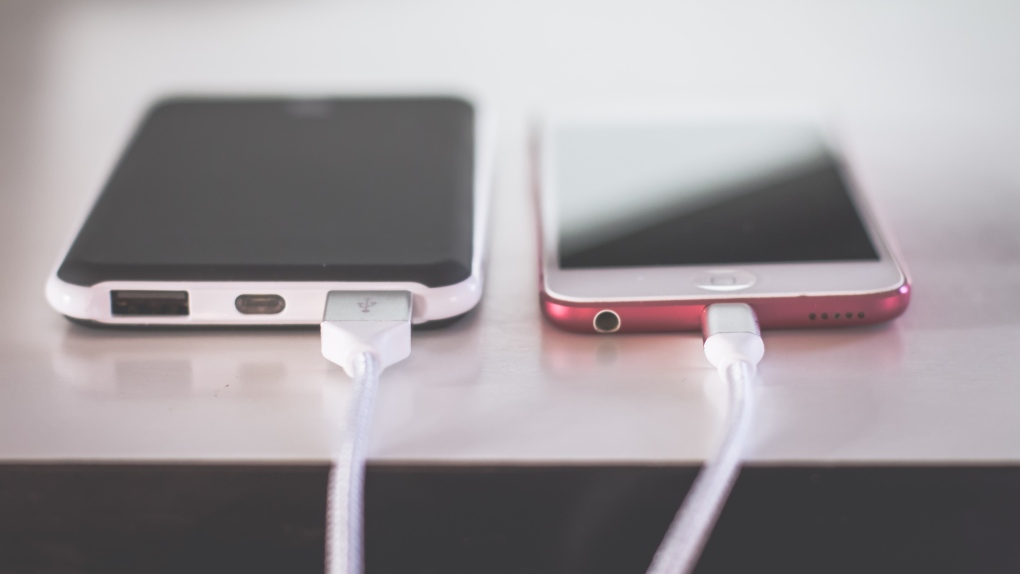
B.C. tenants evicted for landlord's use after refusing large rent increase to take over neighbouring suite
Ashley Dickey and her mother rented part of the same Coquitlam duplex in three different decades under three different landlords.
The European Union is one step closer to forcing Apple and other electronics vendors to use a single charging standard for devices such as phones and tablets.
On Tuesday, the European Parliament gave final approval to new rules that are expected to apply to small and medium-sized electronics beginning at the end of 2024. Larger devices such as laptops will fall under the rules beginning in the spring of 2026.
The first-of-its-kind law will require a vast array of new devices sold in the EU to use the USB-C charging standard. Examples of other covered electronics include rechargeable cameras, headphones, portable speakers and handheld video game consoles.
The decision will largely mean the end of proprietary charging standards in the trading bloc, such as Apple's Lightning connector that's currently used for iPhones.
The EU proposal has prompted calls for similar standards by lawmakers elsewhere around the globe. Earlier this year, in the United States, a trio of Democratic senators asked the Commerce Department to develop a "comprehensive strategy" on charging accessories, citing consumer inconvenience and environmental waste.
During the EU legislative process, Apple told officials the proposed rule would render obsolete as many as a billion devices and accessories that use the Lightning connector, according to an EU Parliament report.
A 2021 study cited in the same report found that iPhones with Lightning connectors accounted for 18% of new mobile phone sales in 2019, with 44% using USB-C and 38% using an older USB connector known as Micro-B.
Tuesday's vote is one of several formal steps that are necessary to finalize a policy hammered out by EU officials this summer. The measure won overwhelming support in the EU Parliament with 602 votes to approve it, 13 votes against and 8 abstentions.
It now heads to the European Council for final approval.

Ashley Dickey and her mother rented part of the same Coquitlam duplex in three different decades under three different landlords.
A man who fell into a crevasse while leading a backcountry ski group deep in the Canadian Rockies has died.
A new survey by Dalhousie University's Agri-Food Analytics Lab asked Canadians about their food consumption habits amid rising prices.
MPP Sarah Jama was asked to leave the Legislative Assembly of Ontario by House Speaker Ted Arnott on Thursday for wearing a keffiyeh, a garment which has been banned at Queen’s Park.
Charlie Woods failed to advance in a U.S. Open local qualifying event Thursday, shooting a 9-over 81 at Legacy Golf & Tennis Club.
As Donald Trump was running for president in 2016, his old friend at the National Enquirer was scooping up potentially damaging stories about the candidate and paying out tens of thousands of dollars to keep them from the public eye.
After Prime Minister Justin Trudeau said the federal government would still send Canada Carbon Rebate cheques to Saskatchewan residents, despite Saskatchewan Premier Scott Moe's decision to stop collecting the carbon tax on natural gas or home heating, questions were raised about whether other provinces would follow suit. CTV News reached out across the country and here's what we found out.
A Montreal actress, who has previously detailed incidents she had with disgraced Hollywood producer Harvey Weinstein, says a New York Court of Appeals decision overturning his 2020 rape conviction is 'discouraging' but not surprising.
Caleb Williams is heading to the Windy City, aiming to become the franchise quarterback Chicago has sought for decades.

Mounties in Nanaimo, B.C., say two late-night revellers are lucky their allegedly drunken antics weren't reported to police after security cameras captured the men trying to steal a heavy sign from a downtown business.
A property tax bill is perplexing a small townhouse community in Fergus, Ont.
When identical twin sisters Kim and Michelle Krezonoski were invited to compete against some of the world’s most elite female runners at last week’s Boston Marathon, they were in disbelief.
The giant stone statues guarding the Lions Gate Bridge have been dressed in custom Vancouver Canucks jerseys as the NHL playoffs get underway.
A local Oilers fan is hoping to see his team cut through the postseason, so he can cut his hair.
A family from Laval, Que. is looking for answers... and their father's body. He died on vacation in Cuba and authorities sent someone else's body back to Canada.
A former educational assistant is calling attention to the rising violence in Alberta's classrooms.
The federal government says its plan to increase taxes on capital gains is aimed at wealthy Canadians to achieve “tax fairness.”
At 6'8" and 350 pounds, there is nothing typical about UBC offensive lineman Giovanni Manu, who was born in Tonga and went to high school in Pitt Meadows.
 Two kinds of smartphone charging cables are plugged in. (Pexels/Steve Johnson)
Two kinds of smartphone charging cables are plugged in. (Pexels/Steve Johnson)